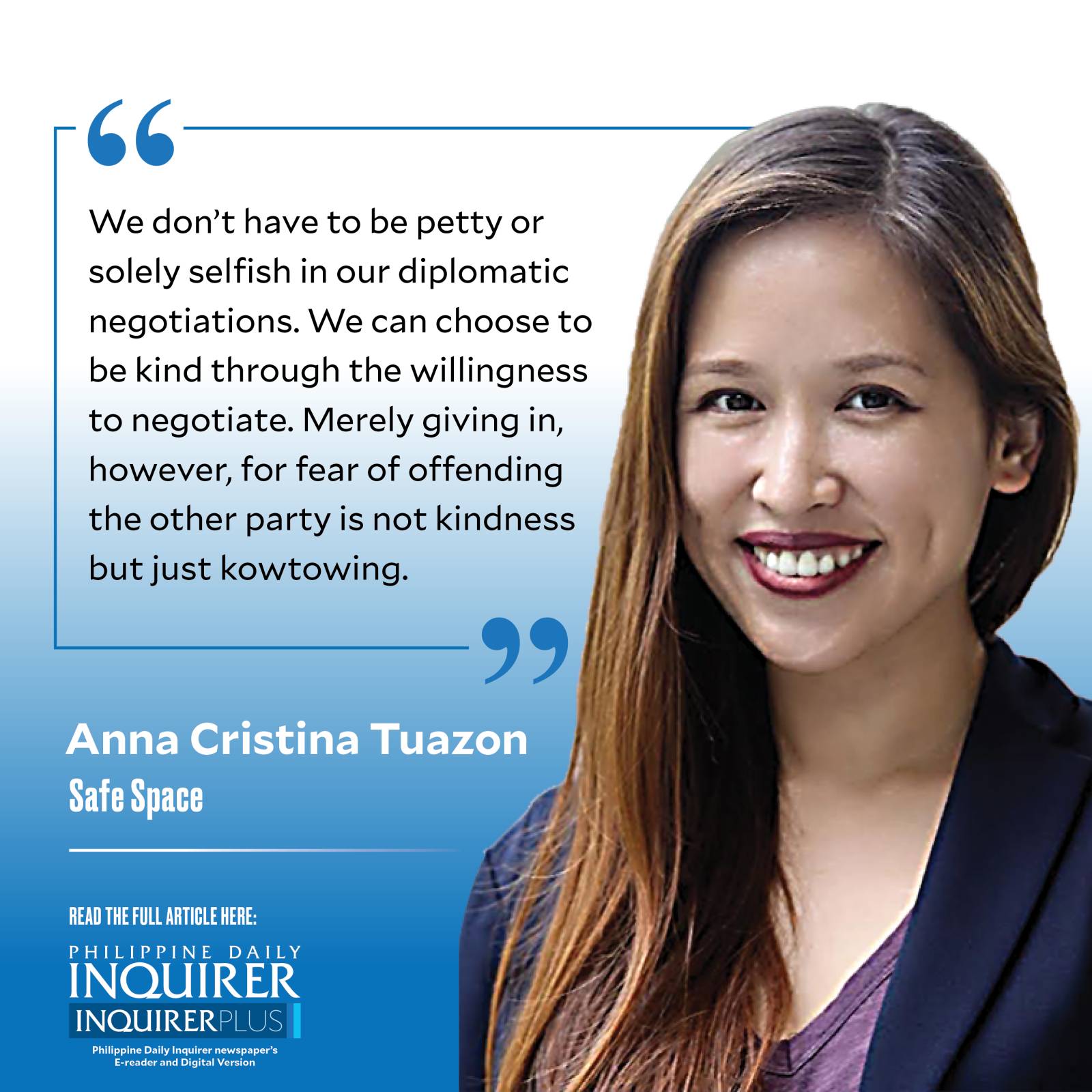The dangers of being nice

The China Coast Guard attacked a Philippine Coast Guard vessel via water cannon last Saturday within the Philippine exclusive economic zone, the latest in a string of provocations and aggressions. How did we get to this point in our diplomatic relations?
As always, I aim to provide a psychological or behavioral lens to national issues as my fellow columnists who are experts in law, political science, and diplomacy will do a much better job dissecting these aspects. What did strike me with this development is that, sadly, this is no longer surprising and somewhat to be expected given that we have been in the business of acquiescing to China ever since the previous administration. We had the prime and historic opportunity when the arbitral ruling awarded in our favor over our maritime disputes against China (incidentally, we just celebrated the anniversary of this ruling on July 12). However, our executive government, at that time, had not made any steps toward enforcement of this ruling and had even assured China that they will not enforce this ruling. This started a particularly troubling dynamic with our aggressor that ultimately led them to double down on their claims in 2023.
Article continues after this advertisementThere is a rudimentary concept in psychology called the “foot-in-the-door” phenomenon. It describes how initially agreeing to small favors lead to agreeing to bigger favors, even if it is against one’s own interests. This is a classic strategy in sales and persuasion. One first asks for a favor so small and convenient that the person would have a hard time justifying a “no.” For example, asking for P5 would rarely garner a negative reaction. At this point, you already have your “foot” in the “door.” Then you could proceed to ask for bigger amounts. Perhaps another P10. Then a P20. Then P100. Then P500. According to this phenomenon, you are more likely to be successful at ultimately receiving P500 this way rather than asking for P500 outright. It is important to note that there is also a complementary strategy called “door-in-the-face” where you start with an outrageous ask (let’s say asking for P5,000) then negotiating down to P500, even though this was the amount you originally intended to ask for in the first place.
What has this got to do with diplomatic relations?
Diplomatic relations are all about negotiation. As such, tactics of persuasion are central. By acquiescing to small asks and favors that go against our national interests, we are setting ourselves up to being taken advantage of in bigger ways.
Article continues after this advertisementA big part of why such tactics work, in a way, is our value of wanting to be nice. As the Sondheim musical goes, “you’re not good, you’re not bad, you’re just nice.” By wanting to play nice with China, we have put our coast guards and fishermen at risk, a really bad thing to do. People often mistake niceness for either kindness or goodness but that is not the case. Niceness mostly concerns itself with being pleasant and not wishing to offend. The danger of this value is that sometimes we privilege not wanting to offend so much that we allow injustices to prevail. We avoid confrontation even when it’s necessary because we want to play nice. Niceness has its merits, but it should also have its limits. Niceness at the expense of protecting human and sovereign rights is unjust.
Niceness is also not kindness. Kindness is not concerned with how others react to us but has a more intrinsic motivation. At its core, it is wanting to do something good for others. True kindness does not seek an audience and mostly prefer to be invisible. We don’t have to be petty or solely selfish in our diplomatic negotiations. We can choose to be kind through the willingness to negotiate. Merely giving in, however, for fear of offending the other party is not kindness but just kowtowing.
Niceness is fundamentally different from goodness. There are many ways to understand and practice goodness. In diplomatic relations, we have to prioritize the good of our people. We also have to prioritize the good of vulnerable groups and sectors, who need the protection of government. The ideal—but harder—path is where the solution is for the good of all. This is where niceness can jeopardize our goodness because niceness tends to prefer avoidance of unpleasant things, which usually steer us toward short-term solutions and sacrificing leverage in the long run.
Filipinos are known for being nice and hospitable. Yet we should not do that at the expense of our own interests. Being good and kind sometimes require taking firm—and unpleasant—stands for the welfare of our country.
—————-
aatuazon@up.edu.ph
















